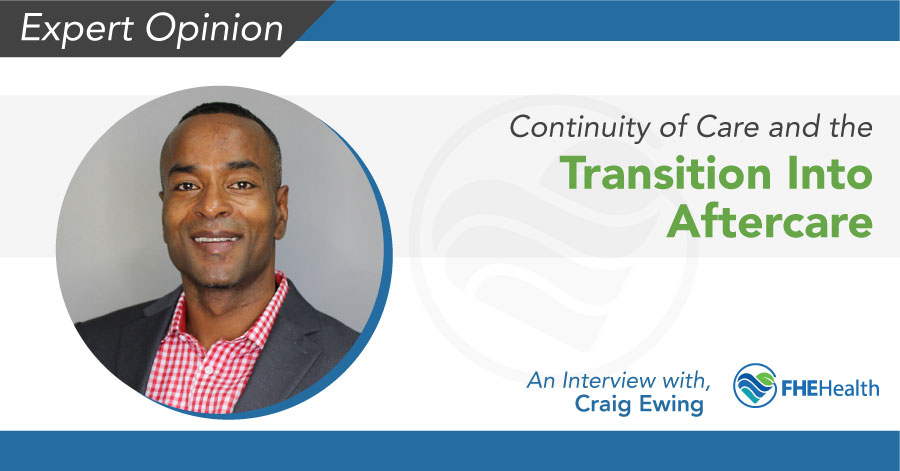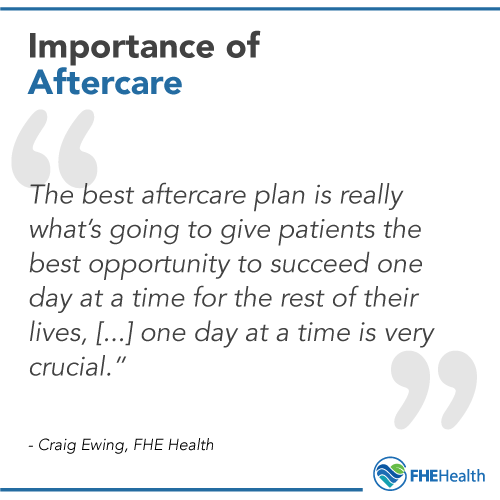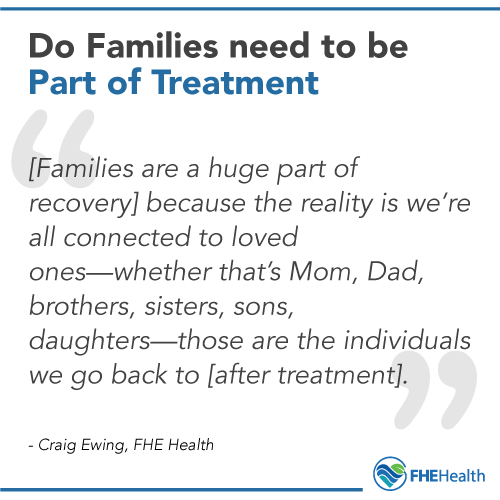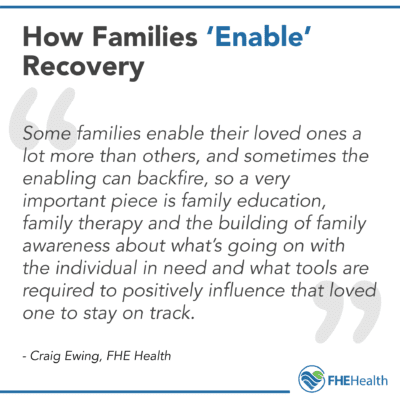
Craig Ewing has been helping patients’ families transition from treatment into early recovery and a program of aftercare for a while now. When he’s asked about that experience, he’s quick to say he’s not a clinician and that the services he provides are not clinical in nature— but it soon becomes apparent from a brief exchange that he plays an essential part in helping to facilitate the continuity of care that our patients receive. As a national outreach liaison for FHE Health, Ewing serves as a constant point of contact for family members who have questions about clinical and other concerns; and, much of Ewing’s job involves helping those families get their questions answered by the appropriate clinical, medical or other departments at FHE Health.
Ewing’s job—while not clinical in nature—is, therefore, one of supporting, resourcing and advocating on behalf of families, so they are well-positioned for life after rehab and the transition into a plan of aftercare with their loved one. In a recent interview, Ewing spoke from his experience about the role of the family in addiction recovery and about how continuity of care depends to a great extent on resourcing families and including them in therapy and other aftercare plans….
The Importance of “Constant Contact” and Aftercare for Patients and Families
 When Ewing describes his role and how he works to support our mission of providing continuity of care to patients and families, he speaks in these terms:
When Ewing describes his role and how he works to support our mission of providing continuity of care to patients and families, he speaks in these terms:
With families of patients, prior to admission, during treatment and after discharge, I’m a constant contact at any time to make sure that families’ needs are met for their loved ones … I interface with our various departments and those particular departments make sure that the patient is being set up with the best possible aftercare plan for when they discharge from our program.
Notice the prioritization here of aftercare— but, why? “The best aftercare plan is really what’s going to give patients the best opportunity to succeed one day at a time for the rest of their lives,” Ewing said, adding that “one day at a time is very crucial.”
In other words, one of Ewing’s priorities is “to make sure that patients have the best opportunity to carry the momentum they acquired in our program and take it with them when they leave into that specific aftercare plan.”
How Quality Aftercare Is Key to Successful Long-Term Recovery
 Within this context, Ewing emphasized the importance of quality aftercare in particular:
Within this context, Ewing emphasized the importance of quality aftercare in particular:
Anybody can go to just aftercare, but if we’re talking about continued success for a healthy lifestyle, quality aftercare needs to be specifically designed for each individual. One size does not fit all. That’s a very vital piece— finding the aftercare that’s best for the individual.
Ewing explained that quality aftercare will be tailored to the patient, their individual needs, and their family and community resources— and, that more often than not, this composite set of needs and resources will differ from one person to another. Ewing emphasized that the development of a good aftercare plan must be guided by what resources for addiction, recovery and mental health are readily available within the community that a patient will be returning to.
Additionally, whereas individual and group therapy may feature prominently in an aftercare plan for someone managing a mental health condition, participation in a 12-step group and finding a sponsor will be “huge” components of an aftercare plan for someone in early recovery from substance abuse, Ewing said.
The Role of Families in Addiction Recovery
Families are integral and in fact “huge part” of any quality aftercare plan, according to Ewing. One reason this is true is “because the reality is we’re all connected to loved ones—whether that’s Mom, Dad, brothers, sisters, sons, daughters—those are the individuals we go back to [after treatment].”
Another reason is that during their loved ones’ time in treatment, “family members communicate with our medical, clinical and psychological teams,” Ewing said. “The family members are in contact throughout the patient’s stay in our program, and this is crucial: This is a unified effort. The families team up with us and we team up with them, and that’s why aftercare is the common denominator for success one day at a time.”
Family Involvement in Substance Abuse Treatment
A family’s involvement in substance abuse treatment can be critical to recovery— but certainly does not end once a patient finishes a program of treatment. Ewing explained that in the lead-up to discharge, the medical, clinical and psychological teams and families are responsible for making the aftercare plan. One of Ewing’s roles is to triage family members’ questions and concerns throughout every stage of treatment, serving as an advocate and support. In this process, he has come to see just how critical family participation is to patients’ longer-term prospects of recovery.
How Families Can Help with Early Recovery from Addiction
 With respect to how families can help with addiction and in early recovery, Ewing said: “families need to heal themselves as well.” During the delicate period after rehab, though, “sometimes we don’t know who has healed and who has not, so this transition back into the family setting can be hard … Families are put into a situation where they must continue to ‘hold the line.’” By “hold the line,” Ewing means “just sticking to the aftercare plan and making sure there’s no enabling going on that will disrupt the aftercare plan.”
With respect to how families can help with addiction and in early recovery, Ewing said: “families need to heal themselves as well.” During the delicate period after rehab, though, “sometimes we don’t know who has healed and who has not, so this transition back into the family setting can be hard … Families are put into a situation where they must continue to ‘hold the line.’” By “hold the line,” Ewing means “just sticking to the aftercare plan and making sure there’s no enabling going on that will disrupt the aftercare plan.”
In fact, enabling can be a common issue for family members in early recovery, according to Ewing: “Some families enable their loved ones a lot more than others, and sometimes the enabling can backfire, so a very important piece is family education, family therapy and the building of family awareness about what’s going on with the individual in need and what tools are required to positively influence that loved one to stay on track.”
Ewing also emphasized the importance of family unity around a shared goal of recovery for their loved one: Another part of this that’s vital is everyone has to be on the same page within the family with one primary goal, which is to provide the best resources and support within the family for that loved one in early recovery.
Family Resources for Addiction
Equally important for families to accept and embrace, though, is the fact that they can only do so much to help their loved one achieve long-term recovery. Regardless of how many resources for addiction families may have at their disposal, families “have to understand that their loved one has to remain willing to utilize these resources— because families can wish, love, enable, support and love unconditionally, but at the end of the day, the individual is the one who has to want to continue the momentum and make sure they’re open and honest and want to do better,” Ewing said. “There’s only so much that family resources can do. The individual has to want to do it.”
- Healing and self-care.
- Holding the line.
- Not enabling.
- Staying unified about recovery goal(s).
These strategies for helping loved ones in addiction are some of the ways that families can do their part to support continuity of care in their loved one’s transition to life after rehab.
“Early recovery is the most sensitive time of recovery,” Ewing said. “That’s why aftercare is as vital as it comes.”






